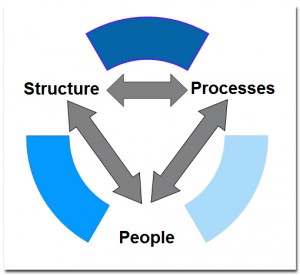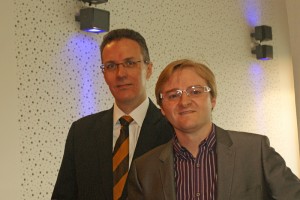10 July, 2012, by Francine Pickering
Building an Innovative Organisation
Ingenuity Knowledge Exchange event – 11 July 2012
Speakers: Dr Mat Hughes, Nottingham University Business School and Stuart Ross“You can’t sack yourself so what are you going to do?”
As a business owner, says Mat Hughes, you might well have fallen into a couple of natural
traps that have killed off your once-entrepreneurial spirit.
Whilst high performance firms understand how to adapt the internal culture to meet the challenges of growth, there is a real tendency for business owners to either stick to tweaking the status quo instead of making the bigger changes necessary to cope with growth, or to be fooled by past successes into believing the business is already sustainably innovative when, in fact, it could be stagnating.
A business owner who embraces innovation needs to balance the needs of a growing business to formalise procedures and controls without being constrained by this way of working. The entrepreneurial business needs to include an organic structure to maintain its freedom to explore new ideas.
Too much of the wrong type of control can mean that as long as an employee has met their targets and ticked the right boxes, their job is done. They will work to the expectations that an overly-controlled environment set and have no need to play a part in exploring new options and ideas. Most importantly, controls should be used to guide development, not to punish mistakes.
As a business grows and needs more formal processes to stabilise its operations, there is a danger that core competencies will focus on what the business already does – not on what it needs to do to maintain its competitiveness. Sony, for example, stuck to what they knew, maintaining their focus on the Walkman personal music device and on their record label. Failing to see the innovative opportunity under their noses, it was Apple who developed the iPod/iTunes innovations, despite not already having the ready resources to hand.
And in charge of this commitment to the status quo is usually an owner whose own ability to detect when change is needed is deteriorating as they rely too heavily on experience that might not be relevant in a changing world. The “Icharus Paradox” means that what once were strengths become weaknesses.
So if your deteriorating entrepreneurial spirit is at fault and sacking yourself is not an option, what can you do?
 Understand that your internal environment is important and is an interaction between structure, processes and people – you must strike the right balance.
Understand that your internal environment is important and is an interaction between structure, processes and people – you must strike the right balance.
Refresh the team around you; bring in new people with new ideas to complement the experience you and your other colleagues have.
Reach out into your own organisation more; get views from the people “on the ground”.
Mat ended with a thought provoking question. Can even the most innovative business owner guarantee that their business will have a sustainable competitive advantage?
No. The world changes to quickly for an established competitive advantage to last forever. But maintaining an innovative culture within the business will enable you to successively – and successfully – generate a series of competitive advantages, comfortable with the ambiguities they face as they grow.
The audience said:
“Mat was excellent, very interesting.”
“The presentations highlighted some of the issues I face every day; it was interesting to think about the results of my actions.”
“It challenged my management.”
The Ingenuity Knowledge Exchange breakfasts are free and open to all business owners. The next event is on 2nd October and sees the ever-popular futurologist, Chris Barnatt, returning, this time with another fast-paced presentation, Seven Ways to Change the World.
No comments yet, fill out a comment to be the first


Leave a Reply